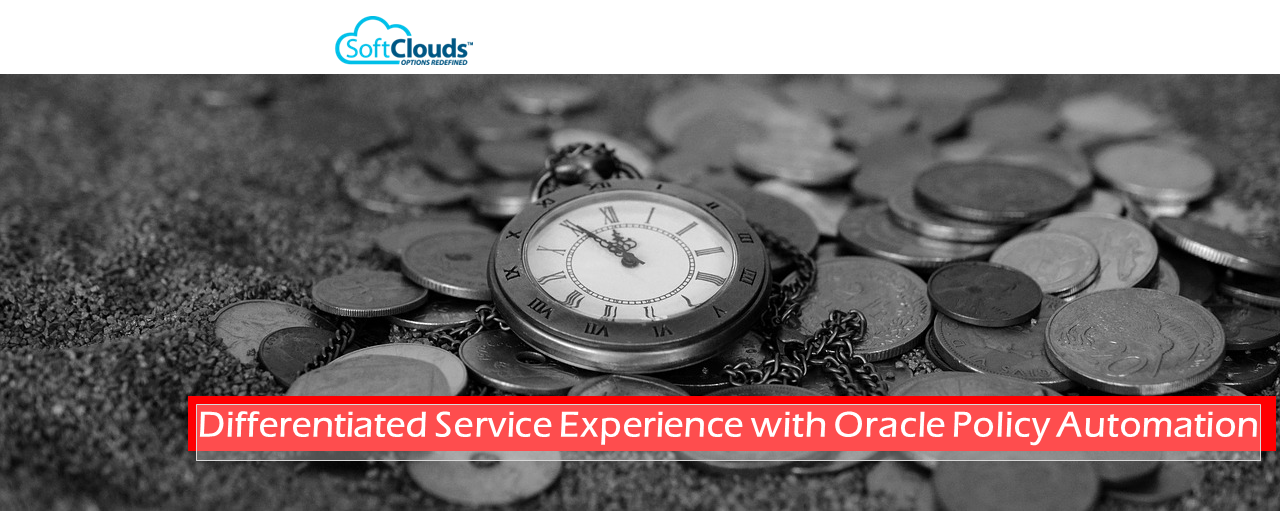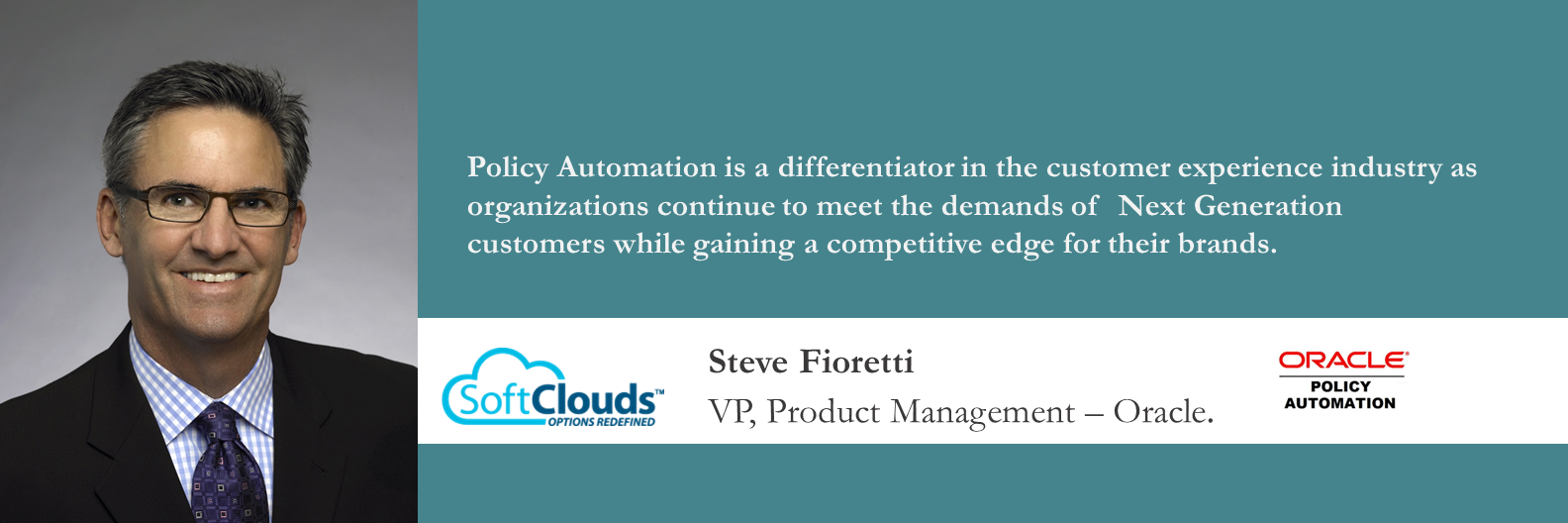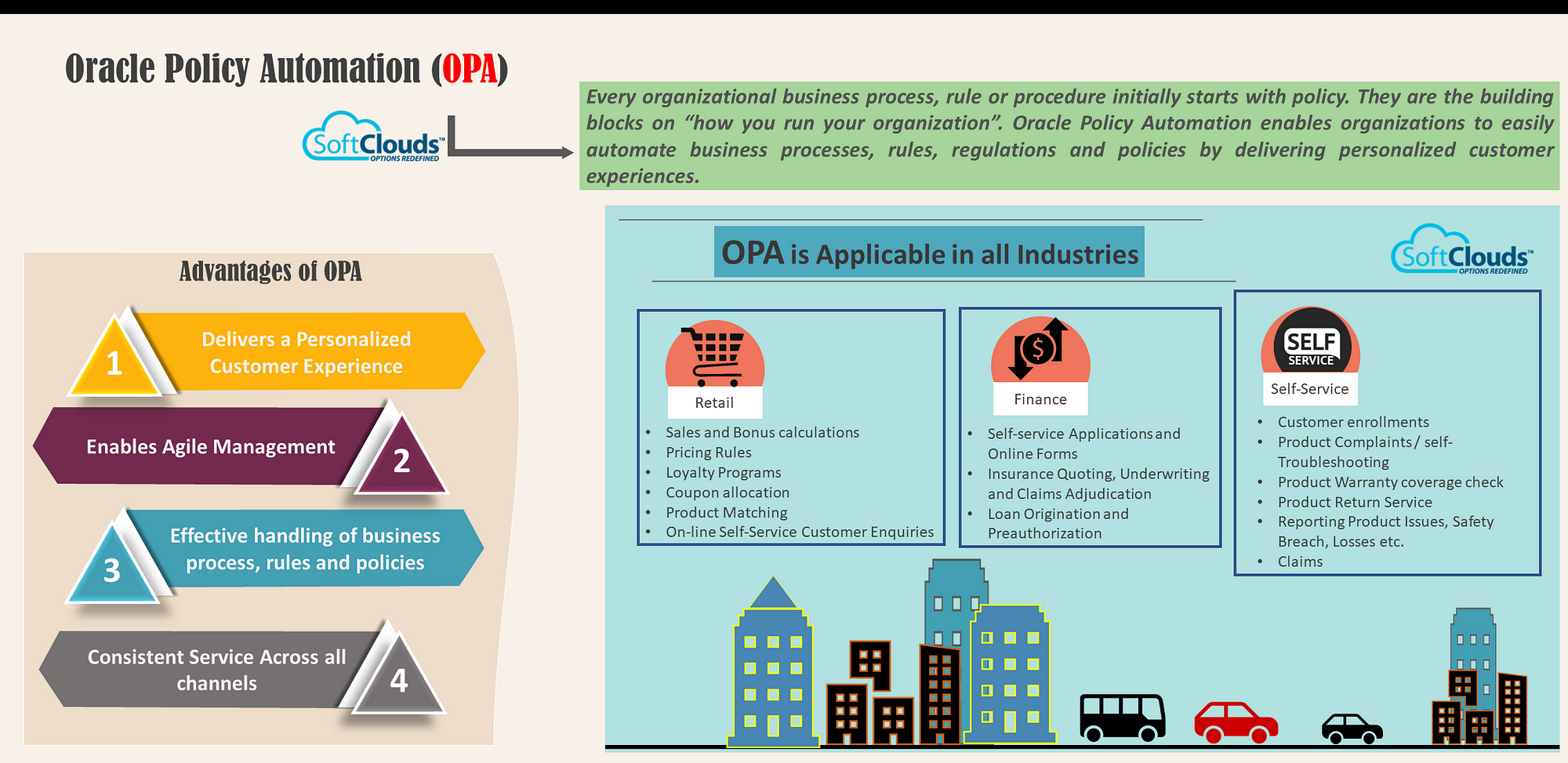Differentiated Service Experience with Oracle Policy Automation


What is a Policy?
Every organizational business process, rule or procedure initially starts with policy. They are the building blocks on "how you run your organization". A policy is a course or principle of action to guide decisions and achieve rational outcomes. Policies are generally formulated and enforced by a business or individual to assist in decision making. Clearly written policies that are documented and updated regularly define the limits of the day-to-day decision-making processes.
How can Customer Experiences be improved?
There are gaps in Customer Service that prevent organizations from differentiating their brand. Policy Automation allows organizations to stay ahead of competitors with a better customer experience by delivering:
- 1. Personalized Experiences — Each interaction is tailored to the customer using questions and data unique to them.
- 2. Agile Management — Business users define the rules as business requirements frequently change and sometimes they need quick responses.
- 3. Transparency and Consistency — Service experience is a consistent multi-channel experience
Oracle Service Cloud (OSvC) & Oracle Policy Automation (OPA)
Oracle Service Cloud gives organizations the ability to provide customers with a combined web, social and contact center experience. In addition to the agents, delivering relevant answers to customer inquiries, inquiries can be managed across email, phone, live-chat, and social channels on a single platform. Oracle Service Cloud is a one-stop solution for organizations to deliver the best customer service by combining a cross-channel contact center, knowledge management and policy automation.
Oracle Service Cloud includes a decision automation solution that provide customers with intuitive, personalized and up-to-date self-service advice. OPA is an end-to-end solution for all industries to manage complex legislation and other document-based policies across processes and channels — including web, contact center, and face-to-face. Foremost, it allows organizations to collect, model, deploy, analyze, and update policies to effectively deliver services and consistently determine policies while complying with laws and regulations.
Responding to regulatory and policy changes only takes a few days. Moreover, with minimal information provided by customers, a company can quickly answer personalized interviews about eligibility and pricing for products and services.
The following are the benefits of OPA:
- Reduced Costs by transforming service delivery and reducing burden on contact centers
- Consistent and effective handling of complex service or calls that are escalated often that ultimately reduces administration costs. Policy Automation will provide advice and perform decision making as part of the customer experience solution thus reducing the costs by automating service in a simple fashion.
- Managing to Skills Shortage — Policy Automation helps the problem of skills shortage by providing a streamlined self-service process.
- Improve accuracy and consistency of advice provided by contact centers.
OPA enables organizations to:
- Streamline the Self-Service Process & Reduce the number of contacts to get to the right answer
- Generate compliance reports
- Personalized Service that Improves customer satisfaction
How OPA Works with Oracle Service Cloud
OPA is a built-in module in Oracle Service Cloud (OSvC) that delivers dynamic online experiences, known as Interviews. These interviews can be used by customers and employees.
Using OPA within the OSvC Web Customer Experience:
- Customers can be anonymous or authenticated users
- Interviews can be embedded in knowledgebase answers or directly on a page
- Incidents and other OSvC objects can be created and updated at the conclusion of the online interview
Using OPA within the OSvC Agent Experience:
- While on the phone, agents can complete OPA interviews on behalf of the customers
- OPA Incidents and other OSvC data points can be created and updated at the conclusion of the online interview


OPA in Various Other Platforms
OPA supports a broad range of platforms and has a flexible service oriented architecture (SOA) that makes it simple to integrate with CRM, ERP and HR systems. Embedding OPA interviews in web pages is easy and can be done simply through an iFrame or div tag that gives more flexibility for customers to use OPA interviews in their web pages and mobile pages irrespective of the technology.
Use Cases of Policy Automation in Multiple — Industries
OPA Provides personalized service for any industry. Each use case depends on the actual business problem that we are solving.
Example 1: Retail
The retail industry can benefit from OPA, which comes with a built-in retail sample, in various ways. Organizations can calculate and apply brand discounts and customer loyalty bonuses as well as simplify other retail-related tasks. OPA for retail streamlines retail processes and provides a solution in a competitive market to drive increased revenue.
Where retailers wanted to provide self-service interviews to their employees / sellers/ customers to deal with following scenarios:
- Sales and bonus calculations
- Pricing rules
- Loyalty programs
- Coupon allocation
- Shipping and import duties
- Product matching
- On-line self-service customer enquiries
- HR
Example 2: Finance
OPA enables financial institutions to ensure proper processes are followed when on-boarding new customers, determine eligibility of suitable financial services products, and to assess risk and report unusual transactions. OPA can help financial institutions assess the impact of business logic changes, competing budgetary priorities, and automate the provision of accurate and consistent advice to customers in a cost-effective manner.
Self-service interviews can be used for insurance providers/ holders to deal with following scenarios:
- Self-service Applications and Online Forms
- Insurance Quoting, Underwriting and Claims Adjudication
- Loan Origination and Preauthorization
- Needs Analysis
- Regulatory Compliance
Example 3: Self-Service
Organizations that need to provide better customer service can benefit from OPA through the creation of self-service interviews. The interview can provide possible solutions to customers and reduce the call volumes in customer service call centers. It is beneficial in dealing with the following scenarios:
- Customer enrollments
- Product complaints / self-troubleshooting
- Product warranty coverage check
- Product return service
- Reporting product issues, safety breach, losses etc.
- Claims
Example 4: Eligibility
OPA can be used when customers want to find out about their eligibility on various cases. Interviews are configured based on eligibility criteria and helps to provide information on a person's eligibility based on the answers given. Some of the cases are:
- Is the student eligible to apply for a specific course/exam/certification/scholarships, etc.
- Is the person eligible to apply for a license to run a business
- Is the person or his/her family eligible to enroll for insurance coverage
- Enrollment of employees in an organization and wages / benefits calculations
- Claims
Example 5: Healthcare
OPA can be used in the event a health care provider needs to provide remote patient care. OPA can be used to build various workflows to diagnose patient health issues by asking questions related to their symptoms. Based on the patient's symptoms, OPA rules can analyze the symptom severity and provide guidelines to the patient about further action they should be taking. This automated process will help the patient find an immediate solution to their problem without contacting customer service and they can also avoid issues of call waiting.
Some of the areas in health care where OPA could be used are:
- Patient health diagnosis and assistance
- Automated doctor appointment system
- Patient enrollment system
- Insurance claim system
- Health Awareness
Example 6: Automotive
The Automotive or Transportation industry can use OPA to determine eligibility for compensation, and calculate amount of compensation or for travel delays. It is also helpful for complex shipping calculations and comparisons. Moreover, it is beneficial because of the constantly changing legislation and regulations in the automotive industry.
Self-service interviews can be used for vehicle manufactures/ owners/ dealer to deal with following scenarios:
- Incentive/bonus calculations
- Fleet management
- Warranty management
- Spare parts management
- Billing and claims processing
- Roadside assistance
Policy automation in the automotive industry can provide consumers with personalized experiences. Improved interviews will lead to better decisions, and customer service can provide up-to-date information on laws and regulations. Furthermore, accurate decisions will increase car sales and provide better maintenance.
Example 7: Higher Education
OPA can help students easily determine eligibility, improve call center performance, and offer student self-service. It can establish and audit faculty policies for all applications to ensure governance and compliance and reduce the time and cost to implement system modifications due to continuous changes in university policies.
Self-service interviews can be used for students and educational organizations to figure out following scenarios:
- Degree or Program Eligibility
- Fee Liabilities
- Enrolment
- English Language Requirements
- Credit Transfers
- Scholarships and Grants
- Graduation Requirements
- Academic Advising
- Academic Promotion
Example 8: Licensing
Policy Automation can be used, for example, by an organization that needs to provide assistance on their licensing business through user self-service. OPA can be configured to determine the user's eligibility for licenses. Depending on the licenses desired, the users will see different questions and outcomes. Different stages of licensing can be handled through a single OPA interview or multiple interviews. Integration with OSvC will help manage multiple interviews by pulling saved data and transferring data between individual interviews.
Some of the Licensing examples where OPA can be used are:
- Starting a Restaurant/ Pub/ Casino etc.
- Driving a Vehicle
- Starting a profit or nonprofit organization
- Real Estate Transactions
- Health Care Related Services
Licensing stages would contain eligibility questions from the following areas based on the type of license:
- Applicant's Location where license should be issued
- Applicant's Age and Education
- Applicant's Citizenship Status
- Applicant's Annual Income
- Applicant's Criminal Records
- Applicant's Credit Status
- Applicant's Loan Payment History
- Type of Business / License
- Duration of License
More Use Cases
OPA can be used in any industry or applications where the company seeks to improve the reliability and consistency of services. Following are more operational areas where OPA can be used:
- Eligibility
- Compliance
- Interactive Self service
- Contact Center Automation
- Case Management
- Risk Assessment
- Complex calculations
- Process improvement
- Claims processing
- Customer on-boarding
- Loan origination


Advantages of OPA
The following are the operational advantages of OPA:
- Web based self-service that can be implemented irrespective of the size of the organization or complexity of business. This reduced costs and builds a better customer experience.
- OPA allows businesses to build complex requirements and policies in less time and with high accuracy.
- OPA helps with multiple uses of the same rules in various business scenarios. Improves usability and reduces redundancy.
- The OPA Rule engine provides an optimized and human readable form of rules.
- Ease of Policy Management and to maintain a complete policy life cycle.
- Reduce volume of service requests created through customer self-service. Increased ROI.
- Cut down the call center and help desk cost by reducing inbound calls and chat sessions. Reduction in costs and increased ROI.
- Good fit for optimization problems.
- Easy for customization, deployments, maintenance and upgrades.
- Compatible with all web browsers with responsiveness feature. Works across multiple devices and browsers.
- Auditing can be performed on each decision which enhances the quality assurance.
- Can be integrated with major CRM systems.
- No technical knowledge or programming language skill required.


The future of Policy Automation:
In an ever-changing world of business requirements, processes, rules, systems and legislation — hard coding of software rules is tough — and hence, a simple business change needs to be simple. Rather than time-consuming tasks, like making changes to the software and the need to conduct tests and delivering, a simple change to policies is simple and immediate.
The world is getting personalized and everyone has their own ideas and ways of doing things. However, with policy automation, we can help them navigate to a personalized solution. To get ahead of competitors, personalization, a core aspect of the customer experience, enables customers to feel valued and appreciated.
Remaining relevant is of utmost importance now more than ever. Especially in today's fast paced environment, the need for OPA to simplify not only the customer's but the organization's experience, will help achieve an outcome that is beneficial to everyone involved in the sales process.
. . .
. . .
This blog was written by Kiran Rajendran, Oracle Cloud CX Architect at SoftClouds. Kiran has over 8 years of experience in building CRM/CX and Cloud-based Applications. His expertise includes architecting, designing, implementing, and troubleshooting real-world enterprise applications. He is passionate about the future of CX and Personalization and is currently focused on Oracle Service Cloud and integrating it in various systems.
If you have any questions, or would like to find out more about SoftClouds and our extensive experience, you can reach us at "info@softclouds.com".